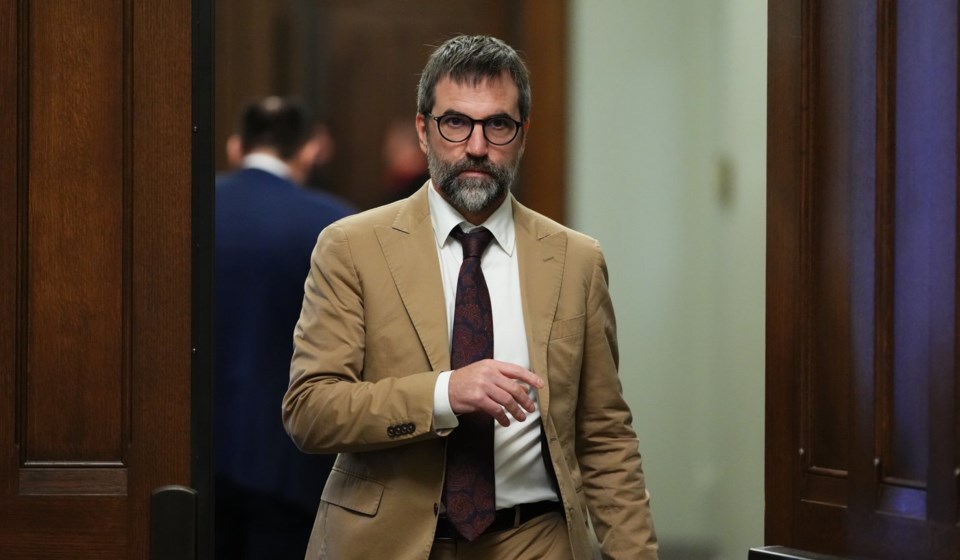Tense negotiations over how much wealthy countries will pledge to their counterparts in the fight to limit global warming have overrun their Friday deadline, a holdup sa���ʴ�ý's environment minister attributed in part to questionable leadership at the United Nations climate summit.
Negotiations at the summit known as COP29 in Azerbaijan were set to drag on through Friday night as countries seek to hash out a new climate finance goal.
sa���ʴ�ý's Environment and Climate Change Minister Steven Guilbeault said he was "disappointed" by some of the proposals so far.
He was critical of host country Azerbaijan for tabling draft deals this week that failed to include previous international agreements to reduce fossil-fuel dependency and scale up renewable energy.
"These should be no-brainers," he said in an interview late Thursday, describing some of the omissions as "inexplicable."
"I've been disappointed so far. It's not too late for them to course correct, but we are rapidly running out of time."
Hanging in the balance at the UN climate talks were questions of just how much assistance wealthier — and historically higher-emitting — countries would pledge, and who would pay for it.
Several independent experts have suggested that developing countries may need upwards of $1 trillion to help them transition away from fossil fuels, adapt to expected climate effects and pay for damages already caused by extreme weather.
The latest draft negotiating text released Friday pledged $250 billion by 2035. That's double the previous goal set 15 years ago, but less than a quarter of what developing countries requested.
There was no indication of how much of that money would come in as grants rather than loans to countries that are already drowning in debt.
Catherine Abreu, a leading Canadian climate policy analyst, called the proposal a "lowest common denominator offering."
Speaking Friday from the conference in Baku, Abreu said developing countries such as sa���ʴ�ý must speak up "really quickly" in order to make the deal more ambitious.
Julie Segal, with Canadian advocacy group Environmental Defence, said the new $250 billion proposal is "stingy" and would be "basically the status quo, if not less," once it is adjusted for inflation.
"This current proposal from wealthy countries has so many holes and is unacceptable relative to the needs," said Segal, in an interview from Baku.
COP29 lead negotiator Yalchin Rafiyev, Azerbaijan's deputy foreign minister, said the presidency hopes to push countries to go higher than $250 billion, saying it doesn't correspond to a "fair and ambitious goal. But we will continue to engage with the parties."
In an interview before the latest draft deal was unveiled, Guilbeault said sa���ʴ�ý "certainly doesn't debate that we need to get to something around $1 trillion by 2030."
"The question is how. It's not going to be all public money. It's not happening," he said Thursday evening.
The previous climate finance goal, agreed to in 2009, saw countries pledge $100 billion annually by 2020. That goal was met two years late, and countries agreed to come up with a new target by 2025, setting up COP29 as a forum to hammer out the details.
Guilbeault said that fixating on a dollar figure cannot come at the expense of making the money more transparent and more accessible to developing countries.
sa���ʴ�ý has also pushed for China and Saudi Arabia to be among the countries added to the list of climate finance donor nations, in recognition of both their growing economies and their share of emissions.
"A number was put forward in Copenhagen in 2009 without a lot of thinking about the overall architecture of what a good financial package would look like," he said.
"This idea that a number will fix everything — been there, done that, got the T-shirt, didn't work."
Caroline Brouillette, executive director of Climate Action Network sa���ʴ�ý, said she has never attended UN climate negotiations so clouded in uncertainty, so close to their deadline.
"Given the fact that we are during the hottest year on record and the crucial nature of this COP for climate multilateralism as a whole, (that) is a really scary and dangerous place to be," she said in an interview from Azerbaijan late Thursday.
This report by The Canadian Press was first published Nov. 22, 2024.
— With files from The Associated Press.
Jordan Omstead, The Canadian Press



